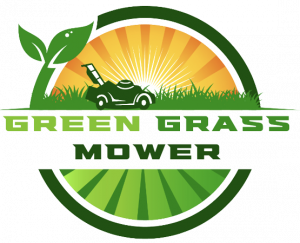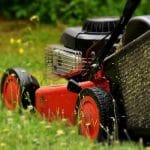Lawn leaf blowers and vacuums are some of the handiest lawn tools you can get. They make lawncare a lot simpler, from taking care of fallen leaves every autumn to gathering loose grass after you mow. You can even use lawn blowers and vacuums to help take care of mulch and keep your garden beds looking tidy.
Of course, if you want to get the best results from a leaf blower or vacuum you need to get a leaf blower that’s up to the job.
In this buying guide, we’ll take a look at the best features of a lawn leaf blower, the pros and cons of different options and types of leaf blower/vacuum, and how you can decide between different options for yourself.
Types Of Lawn Leaf Blower/Vacuums
There are three different basic types of lawn leaf blower and leaf vacuum, based on what kind of power source they use.
Choosing the right power source is critical because it has a huge impact on the rest of how your lawn blower/vacuum functions, and where you can effectively use your leaf blower.
Power type also has a big impact on the weight of your leaf blower, how long it can run continuously, and a few other important features we’ll talk about a little later.
Corded Electric Blowers
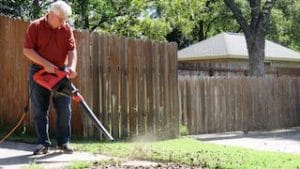
Corded electric lawn blowers and vacuums are getting a lot more popular because they’re more environmentally friendly and have less maintenance than gas-powered blowers.
The good news is that electric corded blowers are as powerful and sometimes more powerful than gas blowers. They come in a range of sizes and both handheld and harnessed versions.
The biggest drawback to using an electric blower is that they are limited by the cord. You can only use them as long as you have an extension cord that can reach, which is usually about 100ft for outdoor extension cords. That means that corded electric lawn blowers are usually only good for smaller yards and urban properties. Or if you only want to keep a small section of your lawn leaf and clippings free.
Battery Powered Blowers
Battery-powered (cordless) blowers and lawn vacuums are other good options if you’re looking for a more eco-friendly option and don’t mind either keeping multiple batteries or having a limited working time.
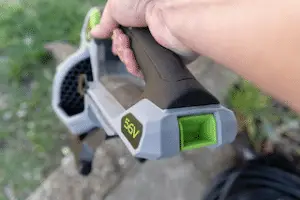 Like a lot of other battery-powered lawn tools, battery-powered blowers still have a reputation for not being as powerful as other options. Thankfully that isn’t true anymore. As both battery and electric motor technologies have improved battery-powered blowers have gotten just as powerful as their gas-powered competitors.
Like a lot of other battery-powered lawn tools, battery-powered blowers still have a reputation for not being as powerful as other options. Thankfully that isn’t true anymore. As both battery and electric motor technologies have improved battery-powered blowers have gotten just as powerful as their gas-powered competitors.
The bigger limitation is functional time. A battery-powered blower will often give you between 10 and 30 minutes of active time. Some models work for longer, but some also have even less effective time.
That means that, much like corded electric lawn blowers and vacuums, battery-powered models tend to work best for smaller yards or taking care of a small portion of your property.
Batteries also add a little weight to your lawn blower or vacuum and are typically a little heavier than gas-powered or electric corded models.
Gas Powered Blowers
Gas-powered blowers are still some of the most popular options, despite the competition, because they tend to work longer than battery-powered options and are much more mobile than corded electric options.
However, there are some drawbacks to gas power.
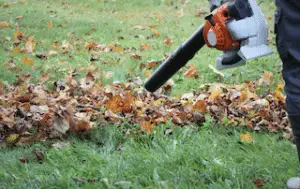 For one thing, gas-powered blowers release greenhouse gasses and fumes while you’re using them, and you’ll breathe at least a little of those fumes during normal operation. They also tend to be a lot louder than the alternatives, which can be a problem if there are noise ordinances in your area.
For one thing, gas-powered blowers release greenhouse gasses and fumes while you’re using them, and you’ll breathe at least a little of those fumes during normal operation. They also tend to be a lot louder than the alternatives, which can be a problem if there are noise ordinances in your area.
Gas-powered lawn blowers and vacuums also tend to need more maintenance than the alternatives. You’ll either need to keep a gas and oil mix for two-stroke gas-powered lawn blowers or give your four-stroke lawn blower regular oil changes to keep it in working order.
Lawn Blower Features to Consider
There are a lot of other factors to consider in addition to the power source of your lawn blower or vacuum. The devil is in the details, and when it comes to lawn blowers these details can make the difference between a functional tool and a frustrating one.
Chances are no one lawn blower is going to be perfect, but if you pick the most important 2-3 features and focus on those, you’ll probably get a model that’s a good option for your needs.
Power, Speed Settings, And Nozzle Shape
Your lawn blower’s power, speed options, and nozzle shape make a big difference in how you can use your blower.
For instance, when it comes to nozzles, rounder shapes are better for lawns that have a lot of embedded leaves and haven’t had maintenance for a while. They help lift the leaves and other lawn litter and get the space ready for other maintenance.
Thinner nozzles, on the other hand, are better for loose leaf litter because they offer more directional control. You’ll be able to direct leaves into a pile or a bag a lot easier with a narrow nozzle, but they won’t do much for embedded leaf litter.
In terms of power, most lawn blowers are similar. Average wind speeds are between 50-200 mph, with a few models outside that range. For most lawn care needs, you want a model that can handle at least 100 mph, whether your model is just a lawn blower or a blower/vacuum combination too.
Having multiple speed settings is a newer feature for lawn blowers, but it can be useful. Slower speeds offer less power but better control. Higher speeds are good for getting a lot of work done quickly, lifting leaf litter, or moving leaves and grass clippings over larger distances.
The best models of lawn blowers and vacuums offer several speed settings, but we tend to see this feature as a perk rather than a must-have for good lawn care.
Lawn Blower Size and Weight
Size and weight are two of the most important things to consider when it comes to how maneuverable your lawn blower is, and how long you can use it safely.
Smaller lawn blowers and vacuums are usually easier to use and better for long-term use (assuming they are gas-powered or corded electric and don’t have limited operating times thanks to a smaller battery). But smaller lawn blowers are often less powerful.
Bigger, heavier lawn blowers are typically more powerful and can be more effective than smaller models, but they can put a lot of strain on your back and shoulders.
There are a few different configurations though, so it’s worth considering what style of grip you’re using as well.
Handheld vs Backpack vs Wheeled Lawn Blowers
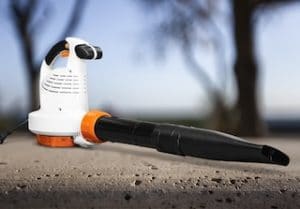 When most people think of lawn blowers they think about the handheld or backpack versions. Handheld lawn blowers are the most common and are usually a good option for suburban properties and most homeowners.
When most people think of lawn blowers they think about the handheld or backpack versions. Handheld lawn blowers are the most common and are usually a good option for suburban properties and most homeowners.
However, they might not be powerful enough for the largest properties, and commercial lawn care companies often prefer backpack versions.
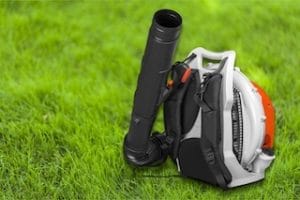
Backpack lawn blowers put most of the weight in a backpack you wear instead of in the handheld portion of the device. You still point to the nozzle and operate the blower with your hands, but the backpack makes it easier to handle a larger weight.
Backpack models are also usually better for owners with shoulder or back injuries.
Lastly, wheeled models are typically designed for one of two reasons.
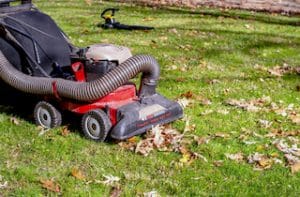
They are either too heavy to use as a handheld or backpack device, or they’re designed for people who cannot lift enough weight for even the lightest lawn blowers.
Wheeled lawn blowers offer a lot of advantages; they can be a lot more powerful for instance. However, they are less maneuverable than either handheld or backpack models and have a steep learning curve.
Cost of the Lawn Blower
Lawn blowers and vacuums aren’t cheap equipment, but that doesn’t mean that you should have to pay more than you need to.
Plan on paying between $200-$500 for a handheld or backpack model, and between $400-$750 for a wheeled or walk-behind model. That’s regardless of power source, but gas-powered models are often a little more affordable than the other types. However, remember that gas-powered lawn blowers have ongoing costs to keep them fueled and well maintained.
Professional models cost significantly more than this, but you most likely won’t need a professional model for personal use.
Noise
Noise is a big consideration for some users. You might be able to use earplugs while you’re using a lawn blower (and you should) but that doesn’t mean that your family or neighbors will be willing to do the same.
The quietest lawn blowers are still usually 60-70 dB, or about as loud as a typical vacuum cleaner. But lawn blowers that quiet are very rare.
More commonly, lawn blowers will range between 100-125 dB, with most models falling somewhere between 80-100 dB.
For reference, 100 dB is about equivalent to a garbage truck or the sound of a train passing.
Leaf Blower / Vacuum Noise Pollution
If you’re considering getting a leaf blower or vacuum, it’s important to check on local regulations in your area before you buy. Some neighborhoods, towns, and HOAs restrict how loud lawn equipment can be, restrict the house leaf blowers can be used, or ban leaf blowers and vacuums entirely.
That’s mostly because of the volume of a typical leaf blower. They’re loud, can be heard from a long way away, and can be highly disruptive in urban and suburban neighborhoods.
If your area has a noise limit, make sure you check the decibel level on any leaf blower you are considering. You should aim for at least a couple of decibels under the limit at max operating volume to be on the safe side.
Bag Size (For Lawn Vacuums)
 When it comes to lawn vacuums, bag size matters. Smaller bags mean stopping to empty or replace the bag more often, while larger bags can be heavy or cumbersome when they’re full.
When it comes to lawn vacuums, bag size matters. Smaller bags mean stopping to empty or replace the bag more often, while larger bags can be heavy or cumbersome when they’re full.
You should also consider whether your lawn vacuum has any mulching features. Mulching reduces the size of leaves and other lawn litter but also means that the same size bag will weigh more when it’s full.
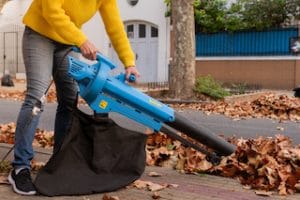 For most consumers, a bag that holds around 20 gallons of leaf litter is about right, but you might want to go smaller if your lawn vacuum mulches at the same time. Typical lawn vacuum bags range in size between about 15 gallons and 24 gallons. Larger options exist, but they tend to be hard to maneuver and work with.
For most consumers, a bag that holds around 20 gallons of leaf litter is about right, but you might want to go smaller if your lawn vacuum mulches at the same time. Typical lawn vacuum bags range in size between about 15 gallons and 24 gallons. Larger options exist, but they tend to be hard to maneuver and work with.
Starter Options
There are two typical types of starters on lawn blowers.
Push-button starters are the easiest to use and are mostly standard on electric corded and battery-powered options. Some gas-powered lawn blowers also use push-button starters, but they’re a little less common.
Gas-powered lawn blowers and vacuums are often pull-start, which can be difficult to use and takes more time.
Push start models are a lot easier, but they can also be a little harder on the internal battery and motor depending on the design.
Overall, we’d say push to start is the better choice, but that pull start shouldn’t be a disqualifier if you’re looking for a gas-powered model and can use other pull-start tools without any problems.
Safety Features
The most important safety feature on a leaf blower vacuum is a secondary immediate off switch. Having an off switch lets you stop the tool a lot more quickly, and having it prominently placed and a secondary switch away from the ignition gives you more options at the moment.
Thankfully there aren’t many situations where you’ll need an emergency off switch when you’re using a lawn blower/vacuum. But with vacuum models in particular it can be helpful if you notice small animals in your yard while you’re using the tool, or if you need to stop your tool in a hurry to deal with something else nearby.
What Is A Good Warranty For A Lawn Blower?
Lawn blower vacuums should have a warranty, just like any other power tools. They can break down, and if something isn’t quite right with your lawn blower you might not know right away.
A typical lawn blower warranty is about 1-2 years. Look for models that offer at least that long on their warranty, and that are sold by reputable brands.
A better lawn blower/vacuum warranty is a 5 year, or limited lifetime warranty. Lifetime warranties are rare, but a lot of the best consumer lawn blowers offer a 5-year warranty.
One final thought…
If choosing between all the options leaves you a little bewildered, the cheapest option is still the good old faithful garden rake…

